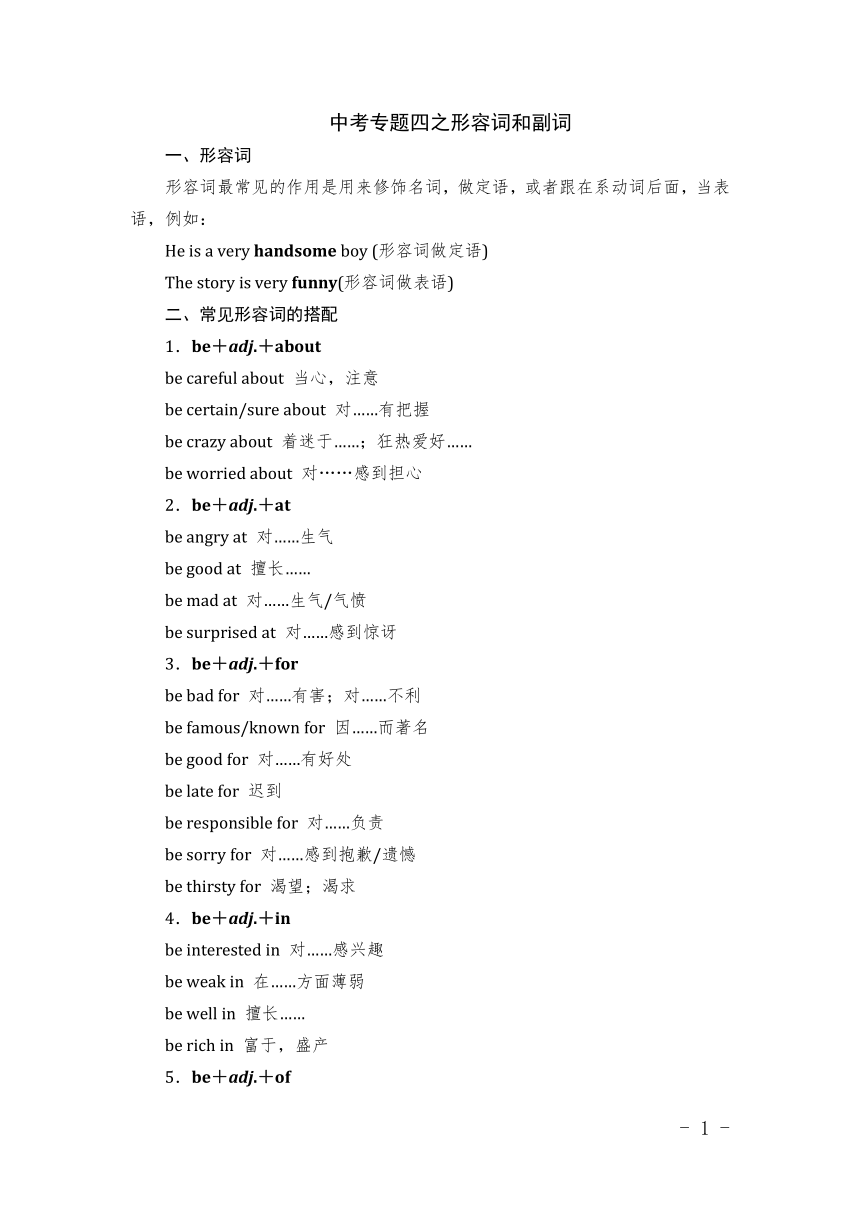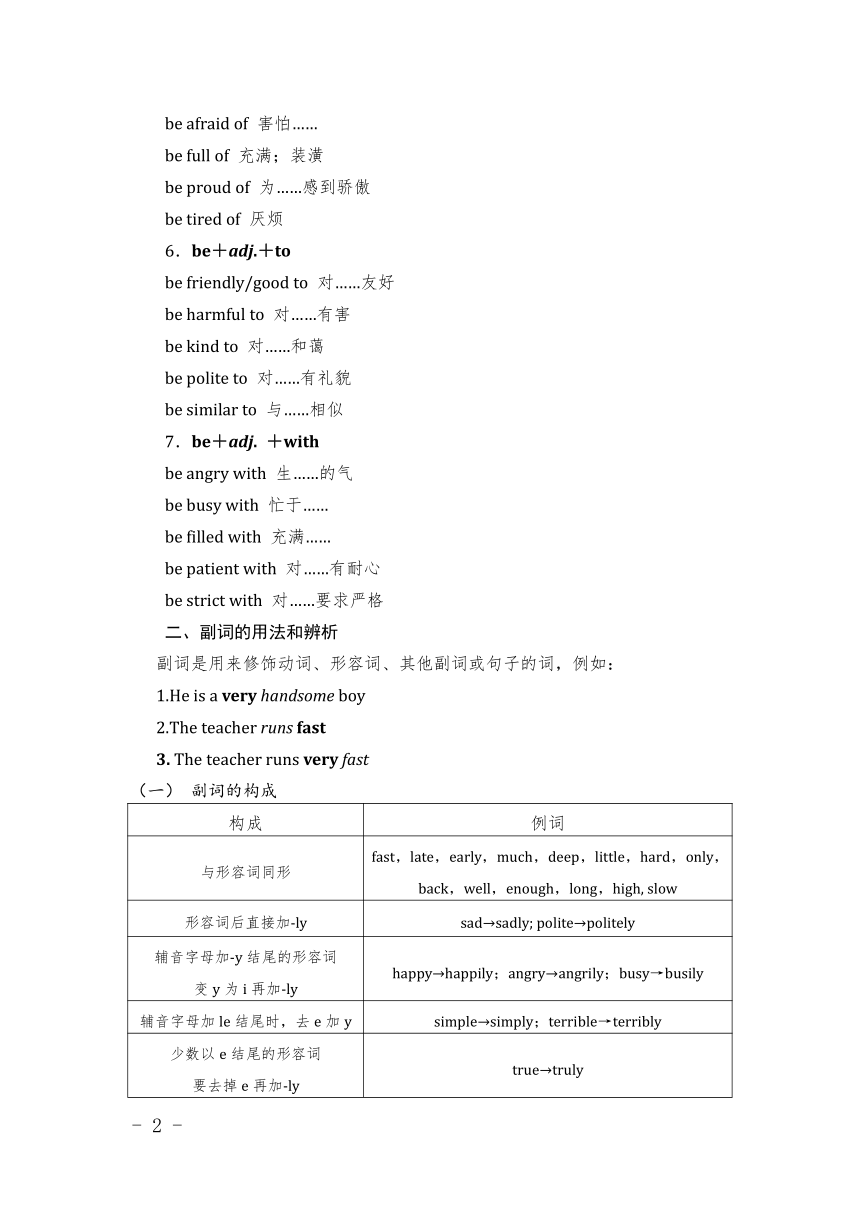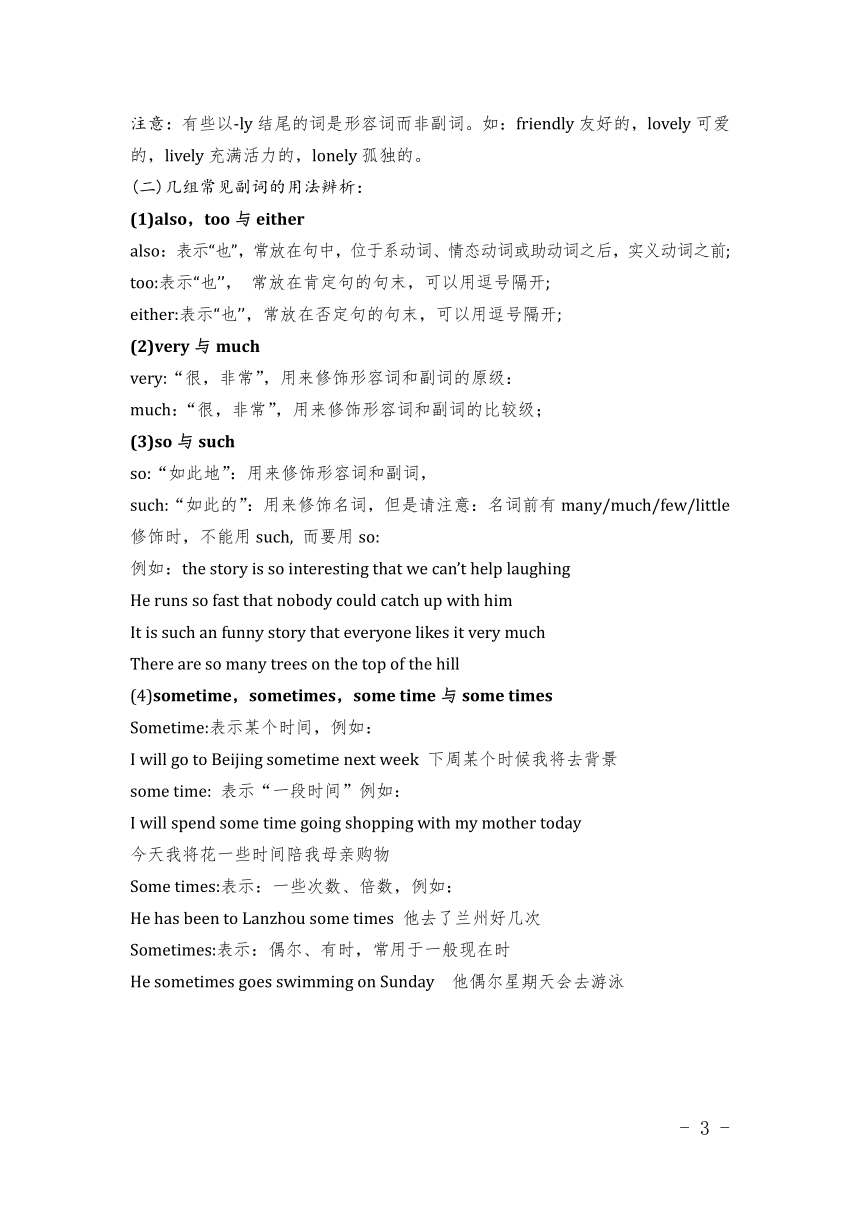2021年中考英语专题之四形容词和副词讲义(word版)
文档属性
| 名称 | 2021年中考英语专题之四形容词和副词讲义(word版) |

|
|
| 格式 | doc | ||
| 文件大小 | 67.5KB | ||
| 资源类型 | 教案 | ||
| 版本资源 | 通用版 | ||
| 科目 | 英语 | ||
| 更新时间 | 2022-01-19 00:00:00 | ||
图片预览



文档简介
中考专题四之形容词和副词
一、形容词
形容词最常见的作用是用来修饰名词,做定语,或者跟在系动词后面,当表语,例如:
He is a very handsome boy (形容词做定语)
The story is very funny(形容词做表语)
二、常见形容词的搭配
1.be+adj.+about
be careful about 当心,注意
be certain/sure about 对……有把握
be crazy about 着迷于……;狂热爱好……
be worried about 对……感到担心
2.be+adj.+at
be angry at 对……生气
be good at 擅长……
be mad at 对……生气/气愤
be surprised at 对……感到惊讶
3.be+adj.+for
be bad for 对……有害;对……不利
be famous/known for 因……而著名
be good for 对……有好处
be late for 迟到
be responsible for 对……负责
be sorry for 对……感到抱歉/遗憾
be thirsty for 渴望;渴求
4.be+adj.+in
be interested in 对……感兴趣
be weak in 在……方面薄弱
be well in 擅长……
be rich in 富于,盛产
5.be+adj.+of
be afraid of 害怕……
be full of 充满;装潢
be proud of 为……感到骄傲
be tired of 厌烦
6.be+adj.+to
be friendly/good to 对……友好
be harmful to 对……有害
be kind to 对……和蔼
be polite to 对……有礼貌
be similar to 与……相似
7.be+adj. +with
be angry with 生……的气
be busy with 忙于……
be filled with 充满……
be patient with 对……有耐心
be strict with 对……要求严格
二、副词的用法和辨析
副词是用来修饰动词、形容词、其他副词或句子的词,例如:
1.He is a very handsome boy
2.The teacher runs fast
3. The teacher runs very fast
(一) 副词的构成
构成 例词
与形容词同形 fast,late,early,much,deep,little,hard,only,back,well,enough,long,high, slow
形容词后直接加 ly sad→sadly; polite→politely
辅音字母加 y结尾的形容词变y为i再加 ly happy→happily;angry→angrily;busy→busily
辅音字母加le结尾时,去e加y simple→simply;terrible→terribly
少数以e结尾的形容词要去掉e再加 ly true→truly
注意:有些以 ly结尾的词是形容词而非副词。如:friendly友好的,lovely可爱的,lively充满活力的,lonely孤独的。
(二)几组常见副词的用法辨析:
(1)also,too与either
also:表示“也”,常放在句中,位于系动词、情态动词或助动词之后,实义动词之前;
too:表示“也’’, 常放在肯定句的句末,可以用逗号隔开;
either:表示“也’’,常放在否定句的句末,可以用逗号隔开;
(2)very与much
very:“很,非常”,用来修饰形容词和副词的原级:
much:“很,非常”,用来修饰形容词和副词的比较级;
so与such
so:“如此地”:用来修饰形容词和副词,
such:“如此的”:用来修饰名词,但是请注意:名词前有many/much/few/little修饰时,不能用such, 而要用so:
例如:the story is so interesting that we can’t help laughing
He runs so fast that nobody could catch up with him
It is such an funny story that everyone likes it very much
There are so many trees on the top of the hill
(4)sometime,sometimes,some time与some times
Sometime:表示某个时间,例如:
I will go to Beijing sometime next week 下周某个时候我将去背景
some time: 表示“一段时间”例如:
I will spend some time going shopping with my mother today
今天我将花一些时间陪我母亲购物
Some times:表示:一些次数、倍数,例如:
He has been to Lanzhou some times 他去了兰州好几次
Sometimes:表示:偶尔、有时,常用于一般现在时
He sometimes goes swimming on Sunday 他偶尔星期天会去游泳
形容词、副词比较等级的用法
(一)形容词、副词比较级和最高级的构成
①规则变化
构成方法 原级 比较级 最高级
一般单音节词末尾加 er, est smallfast smallerfaster smallestfastest
以不发音的e结尾的单音节词末尾加 r, st nicefine nicerfiner nicestfinest
以辅音字母+y结尾的双音节单词先把y变为i,再加 er, est lonelyhappy lonelierhappier loneliesthappiest
以一个辅音字母结尾的重读闭音节单词双写末尾的字母再加 er, est hotbigthin hotterbiggerthinner hottestbiggestthinnest
部分双音节词或多音节词在原级前加more,most interestingimportant more interestingmore important most interestingmost important
②不规则变化
原级 比较级 最高级
good/well better best
bad/ill/badly worse worst
little less least
many/much more most
far farther/further farthest/furthest
old older/elder oldest/eldest
late later latest
③下列单、双音节词只能加more和most
原级 比较级 最高级
like(相似的,同样的) more like most like
real(真的) more real most real
tired(疲乏的) more tired most tired
pleased(高兴的) more pleased most pleased
often(经常) more often most often
(二)形容词、副词比较等级的用法
①原级的用法
只能修饰原级的词:very,quite,so,too,rather。如:
He is too tired to walk on.他太累了以至于不能再继续走了。
as…as和……一样(中间用原级);not as(so)…as和……不一样(中间用原级)。如:
Tom is as old as Kate.汤姆和凯特年龄一样大。
Tom is twice as old as Kate.汤姆的年龄是凯特的两倍。
This room is not so/as big as that one.这个房间不如那个大。
②比较级的用法
可以修饰比较级的词:much,a lot,far,a little,a bit,even,still。
…than…:……比……。如:
Tom is taller than Kate.汤姆比凯特高。
选择疑问句中,二选一时。如:
Which is bigger,the earth or the moon?哪一个更大,地球还是月球?
用比较级形式表示最高级的含义。如:
The Yangtze River is longer than any other river in China.在中国,长江比其他任何一条河都长。(长江是最长的)
“比较级+and+比较级”表示“越来越……”。如:
He is getting taller and taller.他变得越来越高了。
The flowers become more and more beautiful.花儿越来越漂亮了。
“the+比较级,the+比较级”表示“越……,就越……”。如:
The more careful you are,the fewer mistakes you'll make.你越认真,犯的错误就越少。
在比较级中为了避免重复,在than后常用one,that,those等词来替代前面提到过的名词。如:
The weather here is warmer than that in Shanghai.这里的天气比上海的暖和。
表示倍数的比较。如:
This room is three times bigger than that one.这个房间比那个大三倍。
③最高级的用法
形容词最高级前一定要用the,副词最高级前可省略the。
有范围(in,of,among或从句等)修饰时,用最高级。如:
Winter is the coldest season of the year.冬季是一年里最冷的季节。
This is the best film that I have ever seen.这是我看过最好看的电影。
“主语+be+one of the+形容词最高级+复数名词+in/of短语”表示“……是……中最……之一”。如:
Beijing is one of the biggest cities in China.北京是中国最大的城市之一。
选择疑问句中用于三者或三者以上的比较。如:
Which country is the largest,China,Brazil or Canada?哪一个国家最大,中国,巴西还是加拿大?
Which season do you like (the) best,spring,summer or autumn?你最喜欢哪一个季节,春天,夏天还是秋天?
表示“第几最……”时,用“the+序数词+最高级+名词单数”的结构。如:
The Yellow River is the second longest river in China.黄河是中国第二长河。
一、形容词
形容词最常见的作用是用来修饰名词,做定语,或者跟在系动词后面,当表语,例如:
He is a very handsome boy (形容词做定语)
The story is very funny(形容词做表语)
二、常见形容词的搭配
1.be+adj.+about
be careful about 当心,注意
be certain/sure about 对……有把握
be crazy about 着迷于……;狂热爱好……
be worried about 对……感到担心
2.be+adj.+at
be angry at 对……生气
be good at 擅长……
be mad at 对……生气/气愤
be surprised at 对……感到惊讶
3.be+adj.+for
be bad for 对……有害;对……不利
be famous/known for 因……而著名
be good for 对……有好处
be late for 迟到
be responsible for 对……负责
be sorry for 对……感到抱歉/遗憾
be thirsty for 渴望;渴求
4.be+adj.+in
be interested in 对……感兴趣
be weak in 在……方面薄弱
be well in 擅长……
be rich in 富于,盛产
5.be+adj.+of
be afraid of 害怕……
be full of 充满;装潢
be proud of 为……感到骄傲
be tired of 厌烦
6.be+adj.+to
be friendly/good to 对……友好
be harmful to 对……有害
be kind to 对……和蔼
be polite to 对……有礼貌
be similar to 与……相似
7.be+adj. +with
be angry with 生……的气
be busy with 忙于……
be filled with 充满……
be patient with 对……有耐心
be strict with 对……要求严格
二、副词的用法和辨析
副词是用来修饰动词、形容词、其他副词或句子的词,例如:
1.He is a very handsome boy
2.The teacher runs fast
3. The teacher runs very fast
(一) 副词的构成
构成 例词
与形容词同形 fast,late,early,much,deep,little,hard,only,back,well,enough,long,high, slow
形容词后直接加 ly sad→sadly; polite→politely
辅音字母加 y结尾的形容词变y为i再加 ly happy→happily;angry→angrily;busy→busily
辅音字母加le结尾时,去e加y simple→simply;terrible→terribly
少数以e结尾的形容词要去掉e再加 ly true→truly
注意:有些以 ly结尾的词是形容词而非副词。如:friendly友好的,lovely可爱的,lively充满活力的,lonely孤独的。
(二)几组常见副词的用法辨析:
(1)also,too与either
also:表示“也”,常放在句中,位于系动词、情态动词或助动词之后,实义动词之前;
too:表示“也’’, 常放在肯定句的句末,可以用逗号隔开;
either:表示“也’’,常放在否定句的句末,可以用逗号隔开;
(2)very与much
very:“很,非常”,用来修饰形容词和副词的原级:
much:“很,非常”,用来修饰形容词和副词的比较级;
so与such
so:“如此地”:用来修饰形容词和副词,
such:“如此的”:用来修饰名词,但是请注意:名词前有many/much/few/little修饰时,不能用such, 而要用so:
例如:the story is so interesting that we can’t help laughing
He runs so fast that nobody could catch up with him
It is such an funny story that everyone likes it very much
There are so many trees on the top of the hill
(4)sometime,sometimes,some time与some times
Sometime:表示某个时间,例如:
I will go to Beijing sometime next week 下周某个时候我将去背景
some time: 表示“一段时间”例如:
I will spend some time going shopping with my mother today
今天我将花一些时间陪我母亲购物
Some times:表示:一些次数、倍数,例如:
He has been to Lanzhou some times 他去了兰州好几次
Sometimes:表示:偶尔、有时,常用于一般现在时
He sometimes goes swimming on Sunday 他偶尔星期天会去游泳
形容词、副词比较等级的用法
(一)形容词、副词比较级和最高级的构成
①规则变化
构成方法 原级 比较级 最高级
一般单音节词末尾加 er, est smallfast smallerfaster smallestfastest
以不发音的e结尾的单音节词末尾加 r, st nicefine nicerfiner nicestfinest
以辅音字母+y结尾的双音节单词先把y变为i,再加 er, est lonelyhappy lonelierhappier loneliesthappiest
以一个辅音字母结尾的重读闭音节单词双写末尾的字母再加 er, est hotbigthin hotterbiggerthinner hottestbiggestthinnest
部分双音节词或多音节词在原级前加more,most interestingimportant more interestingmore important most interestingmost important
②不规则变化
原级 比较级 最高级
good/well better best
bad/ill/badly worse worst
little less least
many/much more most
far farther/further farthest/furthest
old older/elder oldest/eldest
late later latest
③下列单、双音节词只能加more和most
原级 比较级 最高级
like(相似的,同样的) more like most like
real(真的) more real most real
tired(疲乏的) more tired most tired
pleased(高兴的) more pleased most pleased
often(经常) more often most often
(二)形容词、副词比较等级的用法
①原级的用法
只能修饰原级的词:very,quite,so,too,rather。如:
He is too tired to walk on.他太累了以至于不能再继续走了。
as…as和……一样(中间用原级);not as(so)…as和……不一样(中间用原级)。如:
Tom is as old as Kate.汤姆和凯特年龄一样大。
Tom is twice as old as Kate.汤姆的年龄是凯特的两倍。
This room is not so/as big as that one.这个房间不如那个大。
②比较级的用法
可以修饰比较级的词:much,a lot,far,a little,a bit,even,still。
…than…:……比……。如:
Tom is taller than Kate.汤姆比凯特高。
选择疑问句中,二选一时。如:
Which is bigger,the earth or the moon?哪一个更大,地球还是月球?
用比较级形式表示最高级的含义。如:
The Yangtze River is longer than any other river in China.在中国,长江比其他任何一条河都长。(长江是最长的)
“比较级+and+比较级”表示“越来越……”。如:
He is getting taller and taller.他变得越来越高了。
The flowers become more and more beautiful.花儿越来越漂亮了。
“the+比较级,the+比较级”表示“越……,就越……”。如:
The more careful you are,the fewer mistakes you'll make.你越认真,犯的错误就越少。
在比较级中为了避免重复,在than后常用one,that,those等词来替代前面提到过的名词。如:
The weather here is warmer than that in Shanghai.这里的天气比上海的暖和。
表示倍数的比较。如:
This room is three times bigger than that one.这个房间比那个大三倍。
③最高级的用法
形容词最高级前一定要用the,副词最高级前可省略the。
有范围(in,of,among或从句等)修饰时,用最高级。如:
Winter is the coldest season of the year.冬季是一年里最冷的季节。
This is the best film that I have ever seen.这是我看过最好看的电影。
“主语+be+one of the+形容词最高级+复数名词+in/of短语”表示“……是……中最……之一”。如:
Beijing is one of the biggest cities in China.北京是中国最大的城市之一。
选择疑问句中用于三者或三者以上的比较。如:
Which country is the largest,China,Brazil or Canada?哪一个国家最大,中国,巴西还是加拿大?
Which season do you like (the) best,spring,summer or autumn?你最喜欢哪一个季节,春天,夏天还是秋天?
表示“第几最……”时,用“the+序数词+最高级+名词单数”的结构。如:
The Yellow River is the second longest river in China.黄河是中国第二长河。
同课章节目录
- 词法
- 名词
- 动词和动词短语
- 动词语态
- 动词时态
- 助动词和情态动词
- 非谓语动词
- 冠词
- 代词
- 数词和量词
- 形容词副词及其比较等级
- 介词和介词短语
- 连词和感叹词
- 构词法
- 相似、相近词比较
- 句法
- 陈述句
- 一般疑问句和否定疑问句
- 特殊疑问句及选择疑问句
- 反意疑问句
- 存在句(There be句型)
- 宾语从句
- 定语从句
- 状语从句
- 主谓一致问题
- 简单句
- 并列句
- 复合句
- 主谓一致
- 主、表语从句
- 名词性从句
- 直接引语和间接引语
- 虚拟语气
- 感叹句
- 强调句
- 倒装句
- 祈使句
- 句子的成分
- 句子的分类
- 题型专区
- 单项选择部分
- 易错题
- 完形填空
- 阅读理解
- 词汇练习
- 听说训练
- 句型转换
- 补全对话
- 短文改错
- 翻译
- 书面表达
- 任务型阅读
- 语法填空
- 其他资料
